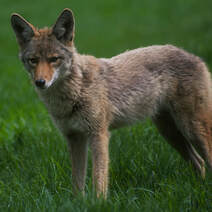Changes in Human Behaviour Lead to Changes in Coyote Routines Springtime is breeding season for coyotes, as it is for many other animals. By and large, coyotes coexist mostly uneventfully with people and domestic animals. However, emerging evidence suggests that the coronavirus crisis is having consequences on coyote behaviours. The decrease in human activity may be driving coyotes into areas they would usually avoid, such as now-deserted town centres. Additionally, the decrease in restaurant, café and takeout meals is reducing the availability of discarded human food, which attracts coyotes and/or their rodent prey. As a result, several concerning incidents have occurred. A person on a local COVID-19-related social media platform said he and his dog were pursued two blocks by a coyote in the Oakridge area Sunday, until they got safely home. News reports say that a dog was killed and a cyclist was pursued by coyotes in the Fraser Valley in recent days. As a result, the B.C. Conservation Officer Service has issued a warning and advice for people to protect themselves and their pets. Preventative measures include:
If you experience a worrying encounter with a coyote (or a wolf), the service advises:
Call the Conservation Officer Service Call Centre at 1-877-952-7277 if a wolf or coyote poses an immediate threat or danger to public safety. If your pet has been injured or has come in contact with a wild animal, call the RAPS Animal Hospital, which is open during this crisis with special protocols in place, at 604-242-1666.
0 Comments
Your comment will be posted after it is approved.
Leave a Reply. |
AuthorWrite something about yourself. No need to be fancy, just an overview. Archives
January 2024
Categories |

 RSS Feed
RSS Feed


